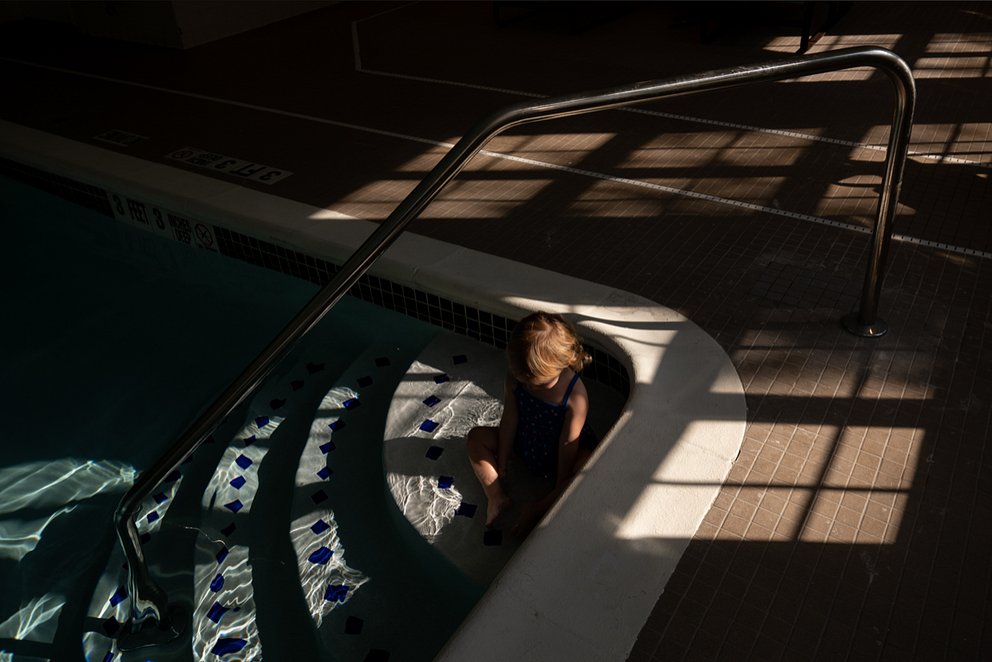Boston
Motherhood Undone: Jennifer McClure at Leica Gallery Boston
by | Nov 21, 2023 10:27 pm
Post a Comment | E-mail the Author
Posted to: Visual Art

Jennifer McClure Photo

Sasha Patkin Photo
How Easily We Are Undone
Jennifer McClure’s photography
Leica Gallery
Boston
Through Jan. 28, 2024
“I never expected to be a mother,” Jennifer McClure writes in her artist statement. “I was forty-six when she was born, and I spent twenty-one days in the hospital after. When I got home, we had a long process of getting to know each other. She became more of her own person, while I let go of the self I thought I knew.”
We hear the same narratives over and over all our lives. For women, these often include narratives of when we’ll marry, have kids, get a house, and settle down. But many of our lives don’t conform to standard narratives, either because we don’t want them to or because life often doesn’t work out as expected. Jennifer McClure’s photography is an examination of these narratives — how we build them, how we topple them, how they influence us, and what happens when we confront them. McClure’s exhibition, How Easily We Are Undone, on display at Leica Gallery Boston display until Jan. 28, offers a deep dive into her complicated relationship with motherhood.

Sasha Patkin Photo
McClure's photographs on display.
McClure’s photographs and prints are technically impressive and deserve to be seen in person. Her images are theatrical, poetic images, filled with sensual light and color and metaphorical depth. They are deeply personal and filled with magic, emotional and sentimental without falling into stereotype. They are dark without being ominous, showing appreciation for the beauty that comes from the sense of disappearing or falling into the darkness.
Two photographs of McClure wrapped in a cloth pointedly bookend the exhibition. In the first, she appears pregnant. In the last, her daughter stands beside her, potentially at the oldest we see her the whole exhibition. In between, there are the expected stereotypical family images, depicted with nuance and beauty. The family resting in bed together, the baby in the bath — images, in other words, which might belong in any other family photo album if it weren’t for McClure’s ability to transform daily scenes into stunning works of light, shadow, and form reminiscent of Renaissance paintings.
These are the typical images of motherhood, full of skin and embraces in an innocent display of maternal intimacy. Ringlets appear in beautiful lighting, light and darkness take on their own roles as characters, stepping into the album as characters of longing, yearning, and delicacy.
I found McClure’s strongest photographs were less posed and more organic, finding subtle metaphors in everyday life. In one image, McClure cats shadow against the shrubbery as her daughter stands in the light in the backyard. In another, her daughter stares into a mirror bathed in pink light, her face moving and blurred, not yet a resolved form.
Much of the metaphorical depth of the show comes from the editing and sequencing, which draws photographs into conversation. In one corner, McClure lies face-up in a dark body of water, and in a separate image on the adjoining wall her daughter lies with her face half-submerged in the blue water of a tub. Other small moments come together and fall apart. In two separate portraits hung next to each other, McClure and (presumably) her husband appear — McClure with only her chin illuminated by light, her husband’s face lost to darkness other than his eyes — almost as if together they make up one complete portrait.

Sasha Patkin Photo
Still others are more evasive in their meanings and filled with looser, less resolved metaphors. Water is pervasive throughout the exhibit, shifting and refracting in each repetition. In one image, her daughter sits in a patch of light at the top of the stairs of a pool as the water sinks into darkness beneath her, and in the next image she is being lifted out of a dark bathtub into the light. In one image the daughter holds her hand under a running faucet with a quizzical look at the photographer, and in another she seems to push her mother away floating in a large body of water. Some are dark, some play with light, some are hopeful, some are sad, but in all the water seems to remind us of the deep depths that we might fall into at any time, at once terrifying and suffocating and unknown, as well as cleansing, pure, and quiet.
It is in the exhibit’s threading of separate but connected moments that I can almost feel the editing process intimately sifting through moments and memories the way one might in dreams or journaling or therapy — processing and putting together the pieces in the creation of a coherent narrative. Large questions loom over the process: How can one be both a mother and an individual? How can one display motherhood in all its realness and complication while also indulging in the sweetness?
By and large, I think McClure is successful in relating the nuance of her narrative. She creates images of motherhood that allow themselves to fall into nostalgia while also remaining realistic and isolated and preoccupied with the unknown. McClure investigates the self and narratives being undone, being reborn, and changing patterns and, as the show’s name indicates, thoughtfully centers a narrative of rejecting narrative.
An excerpt from Jorie Graham’s “On Why I Would Betray You” printed on the wall of the gallery expresses it best:
How easily our tracks
are filled. How easily
we are undone,
knowing the events
without the plot: caution and light and the odor of skin threading
the secret, a loom. What will happen?
What I do
in betrayal
is play at being small, the body a protectorate I can win back
at will; is alter the rules
in the pattern,
what happened.